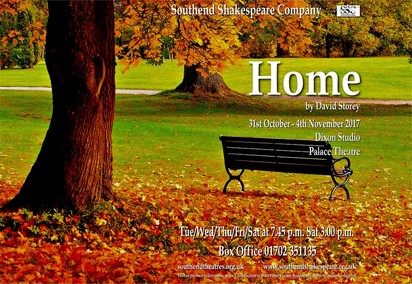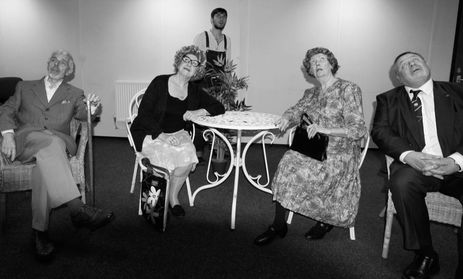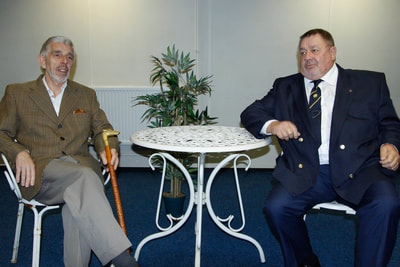Southend Shakespeare Company
present
HOME
by David Storey
31st October - 4th November 2017
present
HOME
by David Storey
31st October - 4th November 2017
HOME is a deceptively quiet play that avoids what is normally thought of as the stuff of drama. Its most exciting moments involve the shuffling of some garden chairs. Do not look for anything in the way of violent emotions, dramatic tension, or even plot development. Or, for that matter, movement - this is a very still play.Yet Southend Shakespeare Company's production is a compelling piece of work that engages you for every second of its length. It proves, once again, that less really can be more. Multitudes of all-singing, all-dancing productions, complete with high corpse-counts and an orgy in every act, fail to pack anything like this level of punch.
There is another strong reason for catching Home before it goes home at the end of the week. The performances are, without exception, simply tremendous. When the five actors line up for the curtain call, mere clapping seems insufficient, You want to elbow your way to the stage and pin medals to their chests.
Home's one-word, monosyllabic title takes on steadily more significance as the play proceeds. The setting is a seating area in a garden attached to some sort of institution.
The (mostly elderly) residents gather here to converse, bitch, unpeel their lives, and, in one case, to do weird things with the garden furniture.
Jack (Bruce Moore) is an immaculately dressed, dignified type, whose gentlemanly airs mask a dirty little secret. Harry (Chris Linnat-Scott) has a wandering mind and a tendency to deliver his thoughts, such as they are, in otiose sentences that nobody can understand. Both men have a tendency to burst into tears for no clear reason.
Their two female companions, Kathleen and Marjorie, are types who were more commonly encountered in the late 1960s, when the play was written, than now – old women, embittered and worn out by hard lives. Their insecurity manifests itself, as so often, in a highly creative spitefulness. This combines, in once case, with an unabashed randiness. Sally Lightfoot and Jacquee Storozynski-Toll invest these characters with rich truth.
The fifth character, Alfred, is much younger than the others. Almost completely inarticulate, he hovers on the periphery of the action, half menacing, half petrified. Using body language more than words, Elliot Bigden does an exceptional job in making Alfred a three-dimensional figure.
We get hints and glimpses of past events that have gone to mould these people's current predicament, but nothing is ever wholly resolved. There is no ending as such, the play simply fades away. Tomorrow, next month, next year, the situation will be the same, We just won't be there to eavesdrop.
Described like this, Home may come across as a sad show. Yet in fact it works as a comedy, and a very amusing one indeed. Playwright David Storey does not pass judgment on his characters, and he certainly does not manipulate or exploit them. He simply listens in to their lives.
What he discovers is a genuine warmth that radiates across to the audience, and humour that is completely unforced. Storey's style as a writer has been compared to Harold Pinter, but I also sensed more than a touch of Jane Austen. As with J.A., you marvel at Storey's ability to weave patterns of comic revelation, simply by sitting a group of quite unremarkable characters together in a small space.
When you leave the theatre at the end, you step out from David Storey's world, into the real world, and they are the selfsame thing. The only difference is that you now feel a bit warmer about the world at large.
A big thank you, then, to director Malcolm Toll for the chance to experience this undeservedly neglected play, and to the SSC cast for rendering such justice to it.
Review by Tom King
Home
Palace Theatre (Dixon Studio), Westcliff
Nightly at 7.45pm, mat Sat 3pm
There is another strong reason for catching Home before it goes home at the end of the week. The performances are, without exception, simply tremendous. When the five actors line up for the curtain call, mere clapping seems insufficient, You want to elbow your way to the stage and pin medals to their chests.
Home's one-word, monosyllabic title takes on steadily more significance as the play proceeds. The setting is a seating area in a garden attached to some sort of institution.
The (mostly elderly) residents gather here to converse, bitch, unpeel their lives, and, in one case, to do weird things with the garden furniture.
Jack (Bruce Moore) is an immaculately dressed, dignified type, whose gentlemanly airs mask a dirty little secret. Harry (Chris Linnat-Scott) has a wandering mind and a tendency to deliver his thoughts, such as they are, in otiose sentences that nobody can understand. Both men have a tendency to burst into tears for no clear reason.
Their two female companions, Kathleen and Marjorie, are types who were more commonly encountered in the late 1960s, when the play was written, than now – old women, embittered and worn out by hard lives. Their insecurity manifests itself, as so often, in a highly creative spitefulness. This combines, in once case, with an unabashed randiness. Sally Lightfoot and Jacquee Storozynski-Toll invest these characters with rich truth.
The fifth character, Alfred, is much younger than the others. Almost completely inarticulate, he hovers on the periphery of the action, half menacing, half petrified. Using body language more than words, Elliot Bigden does an exceptional job in making Alfred a three-dimensional figure.
We get hints and glimpses of past events that have gone to mould these people's current predicament, but nothing is ever wholly resolved. There is no ending as such, the play simply fades away. Tomorrow, next month, next year, the situation will be the same, We just won't be there to eavesdrop.
Described like this, Home may come across as a sad show. Yet in fact it works as a comedy, and a very amusing one indeed. Playwright David Storey does not pass judgment on his characters, and he certainly does not manipulate or exploit them. He simply listens in to their lives.
What he discovers is a genuine warmth that radiates across to the audience, and humour that is completely unforced. Storey's style as a writer has been compared to Harold Pinter, but I also sensed more than a touch of Jane Austen. As with J.A., you marvel at Storey's ability to weave patterns of comic revelation, simply by sitting a group of quite unremarkable characters together in a small space.
When you leave the theatre at the end, you step out from David Storey's world, into the real world, and they are the selfsame thing. The only difference is that you now feel a bit warmer about the world at large.
A big thank you, then, to director Malcolm Toll for the chance to experience this undeservedly neglected play, and to the SSC cast for rendering such justice to it.
Review by Tom King
Home
Palace Theatre (Dixon Studio), Westcliff
Nightly at 7.45pm, mat Sat 3pm



